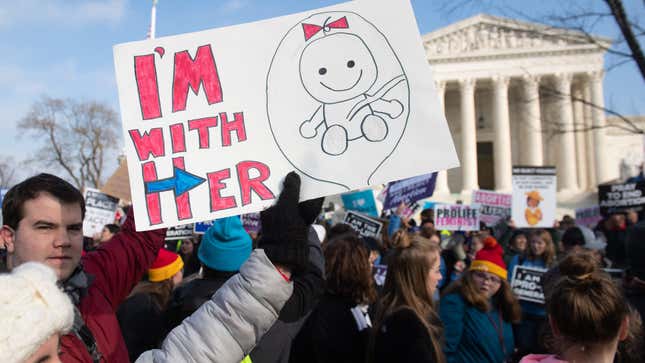There’s No Such Thing As A ‘Pro-Life Feminist’
Gone are the days of Phyllis Schlafly's rigid anti-feminist crusade—today's anti-abortion leaders are pandering to young people with "pro-life feminism."
AbortionPolitics

Even as FX’s Impeachment: American Crime Story took us back in time to the 1990s this summer, the show about the 1998 impeachment of President Bill Clinton was fundamentally modern in its unsettling explorations of the women who helped screw over Monica Lewinsky. One of those women is Susan Carpenter-McMillan, president of the notably conservative Women’s Coalition, advisor to Paula Jones, and, predictably enough, a leading anti-abortion activist. She tells Paula in the second episode of Impeachment, “People get confused when I tell them I’m a conservative feminist. But you don’t have to be a lesbian or an abortionist to believe a woman deserves equal respect to a man.”
The line marks a notable and distinctly modern departure from an anti-abortion movement, which, despite having historically railed against feminism, has more recently deployed a shift in language and leadership as it’s become desperate to court young people and exploit their affinity for social justice. Phyllis Schlafly, the face of the 20th century’s triumphant movement to defeat the Equal Rights Amendment out of concern it would allow women to leave their houses and get abortions, spent the last decades until her 2016 death accusing feminism of making women “unhappy.” But like Carpenter-McMillan on Impeachment, today’s leading anti-abortion activists have learned to brand themselves as the “real” feminists.
Shortly after the Supreme Court heard oral arguments for Dobbs v. Jackson Women’s Health, the New York Times published an op-ed by an anti-abortion author and priest titled, “Why the Feminist Movement Needs Pro-Life People.” The column came at roughly the same time The Lily published a controversial profile of the female attorney general of Mississippi, who’s leading the charge to end legal abortion via the Dobbs case and believes her gender necessarily makes this a feminist undertaking. Another Washington Post article headline reads, “The new face of the antiabortion movement is a young mom of six who listens to Lizzo” — a headline that notably obscures how this young mom of six is trying to take Lizzo’s reproductive rights away. And this summer, a “feminist” author and Catholic scholar published a whole book that attempts to make the case for “pro-life feminism.” All of these sentiments echo a 2018 radio segment in which the president of the anti-abortion group Human Coalition assured listeners that someday we’d all look back and recognize the “original feminists were pro-life.”
His message seems to have resonated: A casual scroll of image results of anti-abortion protests reveals more and more posters declaring “pro-life is pro-women,” or “I’m with HER” (referring to “unborn” women and girls), alongside the usual posters of graphic images of aborted fetuses that share striking resemblance with Lord of the Ring’s Gollum.
In other words, gone is the “barefoot in the kitchen” messaging approach of Phyllis Schlafly. Enter, instead, a new branding approach that’s no longer as overtly, rabidly sexist, but is somehow arguably more sinister — “pro-life feminism.”
In co-opting feminist branding, anti-abortion activists aren’t just attempting to frame their movement as socially progressive — they’re also aligning it with a vastly more popular movement. Believe it or not, loudly declaring “we want to put people in jail for having abortions!” isn’t exactly a winning political slogan these days, but being “pro-woman” is.
“Pro-life feminism” has increasingly become a fixture in electoral politics of late, since 2016 presidential candidate Carly Fiorina branded herself as pro-women while fanatically claiming she witnessed video proof of Planned Parenthood “harvesting” aborted fetuses’ brains. Throughout her father’s presidency, Ivanka Trump similarly appointed herself the White House women’s rights czar, all while stumping for female, anti-abortion politicians throughout her the Trump presidency. It was just this summer that Sarah Palin called herself the “real feminist,” compared to fake feminists like Rep. Alexandria Ocasio-Cortez (D-N.Y.), who “milk the whole female thing” with their support for reproductive rights and sexual assault survivors.
The reality, of course, is that “pro-life feminism” is a misnomer — the two ideologies are mutually exclusive, and the phrase makes about as much sense as a dystopian 1984 tagline like 2+2=5. Believing in “pro-life feminism” is much like believing in Santa Claus — both are ultimately figments of society’s imagination aimed at kids. Contrary to the increasingly commercialized, depoliticized sentiments of conservative and some liberal strains of feminism that regard women wearing powersuits and running exploitative corporations as “feminist,” feminism is a set of actual values to advance gender and social justice rather than anything an individual woman says or does. Forcing pregnant people to give birth against their will, criminalizing people for their pregnancy outcomes including abortion, and consequently placing pregnant people at greater risk of domestic violence and maternal death, all fall squarely in the anti-feminist category.
Kwajelyn Jackson, executive director of the Feminist Women’s Health Center in Atlanta, says her abortion-providing clinic is part of a nationwide network that was founded in the 1970s, when feminist organizers “became interested in developing health centers and spaces where women could have the autonomy and authority to direct their own health care and fix the ways paternalism and patriarchy have existed in traditional health systems.”
-

-

-

-

-

-

-

-

-

-

-

-

-

-

-

-

-

-

-

-

-

-

-

-

-

-

-

-

-

-

-

-

-

-

-

-

-

-

-

-








































